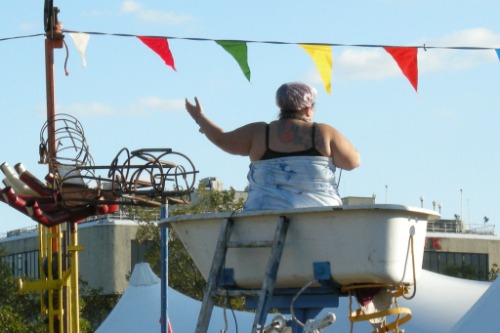1. Pennsylvania: No Singing in the Bathtub

In Pennsylvania, you might want to think twice before belting out your favorite tunes in the bathtub. It is technically illegal to sing while bathing, though there’s no real enforcement of this odd rule. This law most likely dates back to concerns over public safety, particularly the risk of slipping or ingesting water while distracted by a melody. Such a law was likely created in a time when hygiene and public safety concerns were less developed, and it would have been more common for people to bathe in a more communal or less carefully supervised setting.
Today, this law is more of a humorous relic from the past that most people don’t even know exists. While no one is likely to face legal consequences for singing in their own bathroom, it is a quirky reminder of the sometimes strange lengths to which local governments would go to regulate public behavior. Imagine the absurdity of a fine being issued for the crime of enjoying music in the privacy of your own home.
2. California: Frogs Can’t Die in Frog-Jumping Contests

In California, a frog is not allowed to die during a frog-jumping contest—no joke. This odd law originated from the Calaveras County Frog Jumping Jubilee, a quirky local event where competitors race frogs to see who can jump the farthest. Officials implemented this regulation to protect the well-being of the frogs, ensuring that no harm would come to the animals during the competition. If a frog dies mid-jump, it must be disposed of in a respectful manner, though participants are explicitly prohibited from eating the deceased frogs.
This law is a clear example of how, in California, animal rights are taken seriously—even in the most unexpected of contexts. While the event may seem like a harmless and light-hearted competition, the state has made sure that animal cruelty is not part of the fun. Over the years, the Calaveras County Frog Jumping Jubilee has gained national fame, and this law stands as a testament to California’s unique blend of fun and responsibility when it comes to animal treatment. Despite its somewhat comical nature, the rule serves as a reminder that, even in games, ethics and compassion for animals are important.
3. Alabama: No Dominoes on Sundays

In Alabama, playing dominoes on Sundays is officially illegal, a rule rooted in religious and cultural traditions. This regulation most likely originated as part of the broader set of “blue laws” designed to promote rest and discourage leisure activities that could disturb the peace on the Sabbath. While the precise origin of this law is unclear, it was likely enacted to keep Sunday a day of worship and reflection, without the distraction of games or parties that could lead to noise or unruly behavior.
While it is highly unlikely that anyone would be prosecuted for playing dominoes today, this rule remains on the books as a quirky reminder of how societal norms have evolved. The notion that such a minor, casual activity could be banned due to religious observance speaks to how much influence religion once had over public policy. For those in Alabama, it’s wise to make sure your domino games are scheduled on any other day of the week—lest you risk an absurd encounter with the law.
4. Colorado: No Catapulting

In Colorado, launching projectiles with a catapult is banned. This law might sound like something straight out of medieval times, but it remains in place in the state today. Historically, catapults were used as siege weapons in warfare, but it’s unclear why this regulation continues to be enforced in modern times. Some believe that the law may have originated as a measure to prevent the misuse of dangerous weapons or to maintain public safety. Regardless, it reflects a time when the potential for catapult-related mischief was a real concern for local lawmakers.
While it’s highly unlikely that anyone would try to hurl heavy objects using a catapult in the present day, the law still exists, providing an interesting (and somewhat humorous) relic from a more violent time in history. In modern-day Colorado, no one is likely to be launching anything more dangerous than a snowball during the winter months. But the law stands as a quirky reminder of how past conflicts have influenced current regulations, even if those concerns are no longer relevant today.
5. Connecticut: Selling a Used Mattress Without Labeling is Illegal

In Connecticut, selling a used mattress without labeling it as such is illegal. While this law might seem somewhat excessive, it’s an important consumer protection regulation. The intention behind this law is to ensure that used mattresses, which might carry health risks due to bacteria, allergens, or pests, are properly identified as being pre-owned. This ensures that consumers are fully aware of what they’re purchasing and are not unknowingly buying an unsanitary or potentially harmful item.
Though some might see it as an overly cautious regulation, the law speaks to how seriously Connecticut takes public health and safety. By requiring sellers to disclose the used status of a mattress, the state aims to prevent the spread of disease and discomfort among consumers. This rule, while seemingly quaint, has been enforced for decades, making it one of the more practical—but still quirky—laws still on the books today.
6. New York: No ‘Dangerous’ Dances Without a License

In New York, some dances are so “dangerous” that you need a license to perform them in public. This law dates back to the Prohibition era when officials sought to regulate the behavior of people at underground speakeasies. Many establishments during that time were flouting alcohol-related laws, and authorities were looking for any reason to crack down on rowdy gatherings. As a result, dancing—specifically dances deemed too raucous or “indecent”—was regulated.
While the law is a product of a bygone era, it remains on the books, even if its enforcement has long since faded into history. Today, the law sounds almost comical. The idea that a “dangerous” waltz or a “reckless” foxtrot could get you arrested is hard to fathom in today’s world. But this law is an enduring reminder of how societal norms and legal systems can become entangled, creating bizarre regulations that outlive their original intentions.
7. Hawaii: No Coins in Your Ears

In Hawaii, there is an unusual law that prohibits placing coins in your ears. The origin of this rule comes from a time when street performers were known to engage in magic tricks, often using sleight of hand to deceive audiences into thinking they could pull coins from behind people’s ears. This trick became so common that the state decided to outlaw it in an effort to prevent deception, particularly in tourist-heavy areas.
While the law may seem absurd today, it’s a reminder of how states sometimes enact laws to protect consumers from trickery or deceit. It may also reflect the importance that Hawaiians place on public honesty and fairness, especially in their interactions with outsiders. So, while you may not see many magicians working the streets of Honolulu today, the law stands as a quirky piece of the state’s legal history.
8. Idaho: Don’t Sweep Dirt Into the Street

In Idaho, it’s against the law to sweep dirt from your home into the street. The purpose of this law is to maintain cleanliness and ensure that public spaces are kept free of debris. By banning this seemingly innocuous activity, the state aims to prevent the accumulation of dirt in public areas, which could potentially obstruct storm drains or create a mess on the roads.
While it’s hard to imagine this regulation being strictly enforced today, the law provides an interesting perspective on how much attention early lawmakers paid to maintaining public order. In a rural state like Idaho, where outdoor cleanliness is highly valued, this law may have been a practical response to the dusty conditions common in agricultural communities. And while this law might seem trivial, it is a quirky reminder of the importance of keeping things tidy—even in the streets.
9. Indiana: No Bare-Handed Fishing

In Indiana, the practice of fishing with your bare hands—also known as “noodling”—is illegal. This law was put in place to protect both the fish and the people who might be attempting to catch them. Noodling involves reaching into the water and grabbing fish, often catfish, with one’s bare hands. While this practice may sound like a fun and adventurous way to catch dinner, it can be dangerous and even harmful to the fish if done incorrectly.
To prevent unnecessary injury to both the fish and the fisherman, Indiana has outlawed noodling. This law reflects a growing concern for the welfare of animals and the safety of individuals who might engage in potentially hazardous activities. So, if you plan on fishing in Indiana, make sure to leave the bare-handed approach at home and bring along a proper rod and tackle to enjoy your time by the water.
10. Iowa: Mustaches Are Illegal During Public Kisses

In Ottumwa, Iowa, there is an old law that prohibits men with mustaches from kissing women in public. While it might sound like a bizarre and outdated rule, it was likely a reactionary law based on cultural or hygiene concerns from the past. At the time the law was created, mustaches were often associated with unkempt appearances, and public displays of affection were viewed with much more scrutiny.
Though the law is no longer enforced, it serves as an odd reminder of how societal standards and fashion once influenced public behavior. The notion that something as trivial as a facial hair style could restrict personal freedom shows how cultural norms can shape legal systems. Thankfully, today, Ottumwa’s residents are free to kiss whomever they like, regardless of their mustache status.
11. Kansas: No Cherry Pie with Ice Cream on Sundays

Kansas once passed a peculiar law that forbids the serving of cherry pie with ice cream on Sundays. This law likely originated during a time when strict religious observances dictated much of the social behavior, and the Sabbath was considered a day of restraint. The regulation was likely enacted to discourage indulgence and ensure that Sunday remained a more solemn day focused on rest and reflection.
Though this law is rarely enforced today, it stands as a reminder of how much influence religion and societal norms once had over public policy. The idea that one could face consequences for enjoying a dessert pairing that we consider a classic today is both amusing and a bit puzzling. However, this odd regulation remains a quirky part of Kansas’ legal history, one that many modern residents probably don’t even know exists.
12. Kentucky: No Selling Single Dyed Blue Ducks

In Kentucky, selling a single dyed blue duck is illegal unless you’re selling at least six. This unusual law was put in place to discourage the selling of novelty animals, which could potentially create an unethical market for exotic pets or lead to situations where animals are left inappropriately housed or handled. By requiring the sale of at least six, lawmakers hoped to ensure that the birds were bought in bulk and cared for in groups, making the sale more about responsible animal management than about novelty.
Though it may seem excessive, the law reflects Kentucky’s concern for animal welfare and its desire to regulate the exotic pet trade. This regulation likely also addressed concerns about animals being dyed for entertainment purposes, which could be harmful or distressing to the creatures involved. While it may be hard to imagine anyone trying to sell a single blue duck today, this quirky rule still stands as a testament to the state’s history of promoting ethical treatment of animals.
13. Louisiana: No Stealing Crawfish

In Louisiana, stealing someone’s crawfish is a serious crime. While this might sound like an exaggeration, it’s a law that reflects the deep cultural significance of crawfish in Louisiana cuisine and identity. Crawfish is a beloved delicacy that’s enjoyed by many, particularly during the state’s famous crawfish boil season. Because of its importance to the local economy and culture, stealing crawfish is considered a form of theft that can carry hefty fines and even jail time.
This law, while potentially humorous to outsiders, demonstrates the pride Louisianans have for their food and their traditions. With crawfish being such an iconic part of the state’s identity, it makes sense that any attempt to take them unlawfully would be treated seriously. After all, in Louisiana, crawfish is more than just a food—it’s a cultural treasure.
14. Arkansas: No Honking Near Sandwich Shops After 9 P.M.

In Little Rock, Arkansas, honking near sandwich shops after 9 p.m. is illegal. The origin of this odd regulation is shrouded in mystery, though it likely emerged as a measure to curb noise pollution in the late hours. Perhaps at some point, late-night sandwich cravings led to honking outside sandwich shops, disturbing the peace of nearby residents. To remedy this, a law was enacted to restrict honking after a certain hour.
While it’s difficult to imagine that anyone would still attempt to honk for a sandwich today, this law adds a humorous layer to the idea of late-night hunger. It serves as a reminder of how small, seemingly insignificant laws can take hold, often with unclear motivations or origins. Still, for the people of Little Rock, if you find yourself in the mood for a midnight sub, make sure to keep your car’s horn silent—at least after 9 p.m.!


